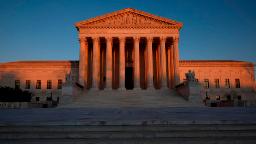[ad_1]

CNN
—
The Supreme Court on Monday sided with a Texas death row inmate who is trying to overturn his conviction based on faulty DNA evidence. In a rare reversal, the inmate received the support of the district attorney involved in the case.
In an unsigned order, the justices agreed to take up the case, but in doing so wiped away the lower court’s decision and sent the case back to that court “for further consideration in light of the confession of error by Texas in its brief filed” in September.
“The most alarming thing about the court’s decision to send the case back for a new trial is that it was even necessary in the first place,” said Steve Vladeck, a CNN Supreme Court analyst and professor at the University of Texas School of Law.
“The state confessed error in the Texas Court of Criminal Appeals, only to have that court affirm the conviction and death sentence anyway. Thus, while today’s decision is clearly the correct one, it unfortunately comes with no public reprobation of the lower court for forcing the Supreme Court to step in.”
Lawyers for the inmate, Areli Carbajal Escobar, told the Supreme Court that his conviction should be wiped away, and Travis County District Attorney Jose P. Garza filed a brief supporting the man he once sought to convict.
A state judge previously ruled in favor of Escobar, finding that “evidence handling issues” in the lab used in the case rendered all DNA evidence found at the scene “unreliable.”
In court papers, Garza told the court that – post-conviction – his office “undertook a comprehensive reexamination of the forensic evidence” after claims were made and determined that Escobar was entitled to a new trial because the state had offered “flawed and misleading forensic evidence at trial” and violated “established federal due process law.”
After deficiencies in the lab were discovered, it was ultimately shut down.
The Texas Court of Criminal Appeals, however, sustained the conviction and held that Escobar’s rights were not violated because he failed to show a “reasonable likelihood” that the false DNA evidence could have impacted the jury’s judgment.
Escobar was initially convicted of murdering 17-year-old Bianca Maldonado Hernandez.
[ad_2]
